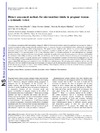Identificador persistente para citar o vincular este elemento:
https://accedacris.ulpgc.es/jspui/handle/10553/44739
| Campo DC | Valor | idioma |
|---|---|---|
| dc.contributor.author | Ortiz-Andrellucchi, Adriana | en_US |
| dc.contributor.author | Doreste-Alonso, Jorge | en_US |
| dc.contributor.author | Henríquez Sánchez, Patricia | en_US |
| dc.contributor.author | Cetin, Irene | en_US |
| dc.contributor.author | Serra-Majem, Lluís | en_US |
| dc.date.accessioned | 2018-11-22T02:08:01Z | - |
| dc.date.available | 2018-11-22T02:08:01Z | - |
| dc.date.issued | 2009 | en_US |
| dc.identifier.issn | 0007-1145 | en_US |
| dc.identifier.other | WoS | - |
| dc.identifier.uri | https://accedacris.ulpgc.es/handle/10553/44739 | - |
| dc.description.abstract | The EURopean micronutrient RECommendations Aligned (EURRECA) Network of Excellence needs clear guidelines for assessing the validity of reported micronutrient intakes among vulnerable population groups. A systematic literature search identified studies validating the methodology used for measuring usual dietary intake during pregnancy. The quality of each validation study selected was assessed using a EURRECA-developed scoring system. The validation studies were categorised according to whether the study used a reference method that reflected short-term intake ( < 7 d) long-term intake ( > or = 7 d) or used biomarkers (BM). A correlation coefficient for each micronutrient was calculated from the mean of the correlation coefficients from each study weighted by the quality of the study. Seventeen papers were selected, which included the validation of fifteen FFQ, two dietary records (DR), one diet history and a Fe intake checklist. Estimates of twenty-six micronutrients by six FFQ were validated against 24-h recalls indicating good correlation for six micronutrients. Estimates of twenty-four micronutrients by two FFQ were validated against estimated DR and all had good or acceptable correlations. Estimates of fourteen micronutrients by three FFQ were validated against weighed DR indicating good correlations for five. Six FFQ were validated against BM, presenting good correlations only for folic acid. FFQ appear to be most reliable for measuring short-term intakes of vitamins E and B6 and long-term intakes of thiamin. Apart from folic acid, BM do not add any more certainty in terms of intake method reliability. When frequency methods are used, the inclusion of dietary supplements improves their reliability for most micronutrients. | en_US |
| dc.language | eng | en_US |
| dc.relation.ispartof | British Journal of Nutrition | en_US |
| dc.source | British Journal of Nutrition [ISSN 0007-1145], v. 102 (sup. 1), p. S64-S86, (Diciembre 2009) | en_US |
| dc.subject | 3206 Ciencias de la nutrición | en_US |
| dc.subject.other | Validation | en_US |
| dc.subject.other | Pregnant Women | en_US |
| dc.subject.other | Dietary Assessment Methods | en_US |
| dc.subject.other | Systematic Review | en_US |
| dc.subject.other | Validation | en_US |
| dc.subject.other | Micronutrients | en_US |
| dc.title | Dietary assessment methods for micronutrient intake in pregnant women: a systematic review | en_US |
| dc.type | info:eu-repo/semantics/article | en_US |
| dc.type | Article | en_US |
| dc.identifier.doi | 10.1017/S0007114509993151 | en_US |
| dc.identifier.scopus | 77449116054 | - |
| dc.identifier.isi | 000274689800006 | - |
| dc.contributor.authorscopusid | 15519923300 | - |
| dc.contributor.authorscopusid | 7801473288 | - |
| dc.contributor.authorscopusid | 6506470598 | - |
| dc.contributor.authorscopusid | 7006082971 | - |
| dc.contributor.authorscopusid | 35596972100 | - |
| dc.identifier.eissn | 1475-2662 | - |
| dc.description.lastpage | S86 | en_US |
| dc.description.firstpage | S64 | en_US |
| dc.relation.volume | 102 Suppl 1 | en_US |
| dc.investigacion | Ciencias de la Salud | en_US |
| dc.type2 | Artículo | en_US |
| dc.contributor.daisngid | 2492539 | - |
| dc.contributor.daisngid | 4584085 | - |
| dc.contributor.daisngid | 3710201 | - |
| dc.contributor.daisngid | 52113 | - |
| dc.contributor.daisngid | 28836 | - |
| dc.description.numberofpages | 23 | en_US |
| dc.utils.revision | Sí | en_US |
| dc.contributor.wosstandard | WOS:Ortiz-Andrellucchi, A | - |
| dc.contributor.wosstandard | WOS:Doreste-Alonso, J | - |
| dc.contributor.wosstandard | WOS:Henriquez-Sanchez, P | - |
| dc.contributor.wosstandard | WOS:Cetin, I | - |
| dc.contributor.wosstandard | WOS:Serra-Majem, L | - |
| dc.date.coverdate | Enero 2009 | en_US |
| dc.identifier.supplement | 1 | - |
| dc.identifier.ulpgc | Sí | es |
| dc.description.jcr | 3,446 | |
| dc.description.jcrq | Q1 | |
| dc.description.scie | SCIE | |
| item.fulltext | Con texto completo | - |
| item.grantfulltext | open | - |
| crisitem.author.dept | GIR IUIBS: Nutrición | - |
| crisitem.author.dept | IU de Investigaciones Biomédicas y Sanitarias | - |
| crisitem.author.dept | Departamento de Ciencias Clínicas | - |
| crisitem.author.dept | GIR IUIBS: Nutrición | - |
| crisitem.author.dept | IU de Investigaciones Biomédicas y Sanitarias | - |
| crisitem.author.dept | Departamento de Ciencias Clínicas | - |
| crisitem.author.dept | Departamento de Ciencias Clínicas | - |
| crisitem.author.dept | GIR IUIBS: Nutrición | - |
| crisitem.author.dept | IU de Investigaciones Biomédicas y Sanitarias | - |
| crisitem.author.dept | Departamento de Ciencias Clínicas | - |
| crisitem.author.orcid | 0000-0002-7270-7684 | - |
| crisitem.author.orcid | 0000-0002-1170-2820 | - |
| crisitem.author.orcid | 0000-0002-9658-9061 | - |
| crisitem.author.parentorg | IU de Investigaciones Biomédicas y Sanitarias | - |
| crisitem.author.parentorg | IU de Investigaciones Biomédicas y Sanitarias | - |
| crisitem.author.parentorg | IU de Investigaciones Biomédicas y Sanitarias | - |
| crisitem.author.fullName | Ortiz, Adriana Patricia | - |
| crisitem.author.fullName | Doreste Alonso, Jorge Luis | - |
| crisitem.author.fullName | Henríquez Sánchez, Patricia | - |
| crisitem.author.fullName | Serra Majem, Luis | - |
| Colección: | Artículos | |
Citas SCOPUSTM
37
actualizado el 08-jun-2025
Citas de WEB OF SCIENCETM
Citations
37
actualizado el 08-feb-2026
Visitas
64
actualizado el 10-ene-2026
Descargas
62
actualizado el 10-ene-2026
Google ScholarTM
Verifica
Altmetric
Comparte
Exporta metadatos
Los elementos en ULPGC accedaCRIS están protegidos por derechos de autor con todos los derechos reservados, a menos que se indique lo contrario.
